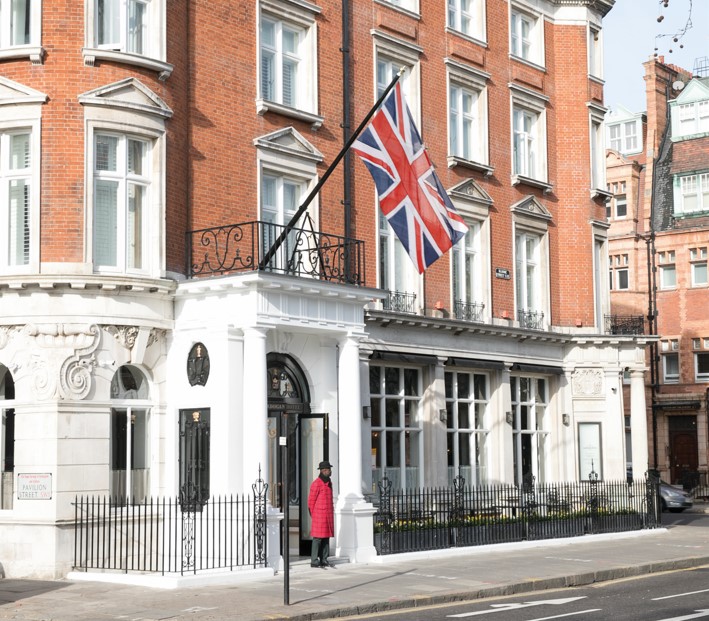The Perfect Partner
Whether it’s hotels linking arms with sportswear or fashion houses teaming up with video games, luxury B2B collaborations are having a very big moment. But what’s the thinking behind the connections? Lysanne Currie explains
Around the turn of the century, Marc Jacobs, then creative director of Louis Vuitton, had a genius idea – and one that would have far-reaching implications. He partnered up with artist Stephen Sprouse for Louis Vuitton’s spring/summer 2001 collection – and the market has followed – ahem – suit ever since. Everyone from Balenciaga and Yeezy Gap to Adidas and Gucci have seen the benefits of cross-brand collaborating, and the trend shows no sign of petering out anytime soon.

One of this year’s most groundbreaking partnerships has been the new concept-car collaboration between the late designer Virgil Abloh and Mercedes-Benz. Before his death in November last year, the Off-White designer (and men’s artistic director of Louis Vuitton) had remixed Mercedes’ iconic Maybach S-Class. The limited-edition car – only 150 are available – was launched in April.
Indeed, Abloh was something of a pioneer when it came to luxury mashups, having previously worked with IKEA (the MARKERAD collection), Evian (the evian x Virgil Abloh water bottle range) and Nike (bespoke Air Force 1s for Louis Vuitton’s spring/summer 2022 collection).
Partly thanks to Abloh popularising the trend, it seems that today you can’t move for luxury cross-pollinations. This year will see a trio of crossovers between brands that few would have previously considered as bedfellows: Adidas x Gucci (the sportswear brand has also collaborated with Balenciaga on a forthcoming collection); the Omega x Swatch Bioceramic MoonSwatch; and a second North Face x Gucci hook-up.

What’s more, these alliances span the worlds of automotive (Rimowa and Porsche’s new limited-edition suitcase), anime filmmaking (Loewe and Tokyo’s Studio Ghibli’s capsule collection based on the seminal <Spirited Away> film) and fitness (Dior Vibe and fitness brand Technogym have teamed up to launch pop-up sportswear stores).
And travel, too. Bulgari and Armani were early-adopters in the first years of this century, having developed their own branded hotels, in Milan and Dubai, respectively. The trend is set to continue in 2024, when Hyatt launches the world’s first Fila-branded hotel, while yacht brokerage firm Edmiston recently announced a collaboration with Farnborough: a private lounge for Edmiston customers at the UK private-jet airport.
Both ventures follow hot on the heels of LA-based denim brand Frame’s partnership with New York’s Carlyle hotel (part of the Rosewood Hotel Group) on a collection of sweatshirts, tees and baseball caps. As Joanna Gunn, Rosewood Hotels Group’s chief brand officer, told Vogue Business, The Carlyle had brought “a slightly different expression of its personality to life”.
Why are so many collaborations flooding the world of luxury right now? It’s all partly to do with what Vogue Business calls ‘If-you-know-you-know marketing’ – collaborating in order to extend the reach of existing brands to different, younger audiences and making consumers feel as if they’re part of an exclusive club. Thus, according to Vogue Business, brand-new communities made up of fans of both brands are created, ‘who feel like they’re in on an inside joke or secret’.

Win Win
On the most basic level, brand partnerships, whether it’s Adidas teaming up with Gucci or Hyatt collaborating with Fila, can help both parties reach new markets. As lifestyle journalist and cultural commentator Flic Everett says, “I think collaborations are of huge value to brands because they double the potential audience, and bring the brand to a new demographic who may not previously have registered the name. They also bring value to readers and consumers, most often through images that challenge their usual expectations: the Fendace[Fendi and Versace] catwalk show last year and accompanying celebrity guest list captured endless column inches, far more than a single show for either would have attracted.”
Fashion and retail consultant Robert Burke agrees. “It says everything about how fashion has changed. Designers now realise that they can feed off each other’s talent and creativity. There is strength in numbers and supporting each other as opposed to being in a stand-off.”
Collaborations can even alter brand perception. As Kathryn Parker, senior associate in luxury goods research at Jefferies, told the Financial Times: “When millennials and Gen Z are deciding which brands to buy from, they very much think about values rather than just products and marketing campaigns.”
Fundamentally, a collaboration can also be a way of simply livening up a marketing strategy with an element of surprise or delight – jolting consumers out of complacency, grabbing attention and shifting units. As Everett says, “novelty stops brands getting ‘tired’ or siloed in a stagnant demographic.”
It can also be a way of signalling shared values or ethics. But this must be honest: as Matt Elek, former CEO, EMEA, Vice Media, told Campaign: “Being truthful and authentic is critical… It can hurt a brand when they try to do partnerships that frame them as something they are not. The key to a great partnership is that everyone commits to achieving value on all sides.”
A certain global pandemic may also have played a part: with fashion houses seeking alternative means of reaching shoppers when the stores were shut, the likes of Ralph Lauren, Balenciaga and Burberry have partnered with video games such as Fortnite, Honor of Kings and Zepeto. As Wired reported, if ‘fashion has been slow on the uptake with digital and immersive technologies… the pandemic forced the industry’s hand’.Could collaborations even be the future of marketing? Marketing guru Abigail Comber (British Airways, L3, Oyster Yachts) thinks so. “True partnerships that work always make the individual partners stronger and better than they would normally be alone,” she told Campaign. Dan Chard, Global Director, Commercial Partnerships, Apollo World Touring, agrees: while brands can always create their own events, “this is expensive and risky. Partnerships mean you spread the load – and each partner can deliver what they do best.”
Continue Reading Fox Quarterly…

